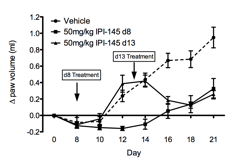Session Information
Session Type: Abstract Submissions (ACR)
Background/Purpose: Phosphoinositide 3-kinase (PI3K) is a family of intracellular signaling transducers and could be targeted to treat inflammatory diseases like rheumatoid arthritis (RA). However, blockade of the a and b isoforms could cause significant toxicity due to their ubiquitous expression. On the other hand, g and d isoform expression is restricted mainly to leukocytes and, for the latter, synovial fibroblasts. These enzymes regulate a variety of innate and adaptive immune pathways, especially through activation of AKT. In this study, IPI-145, a novel potent PI3K-d,γ inhibitor (Ki‘s: PI3K-d: 16 pM, PI3K-g: 244 pM, PI3K-β: 1.6 nM and PI3K-a: 25.9 nM) was tested for its activity in the rat adjuvant induced arthritis model.
Methods: Rat adjuvant arthritis was induced by immunizing Lewis rats with CFA. Then, from either Day 8 or Day 14 through Day 21 one of three treatments (vehicle, 10 or 50mg/kg/d IPI-145) was administered daily by oral gavage. Paw swelling was assessed by plethysmometry, radiographs by a semi-quantitative scoring system, ankle gene expression by qPCR (relative expression units; REU), and pAKT and AKT by Western blot. Clinical endpoints were assessed every other day from Day 0 through Day 21.
Results: Treatment with 10 or 50 mg/kg/d of IPI-145 (n=16/group) beginning on day 8 prior to onset of ankle swelling inhibited arthritis progression in a dose dependent fashion. Disease progression was significantly reduced at 50 mg/kg from Day 12 through Day 21 (see Figure; p<0.05) when initiated on Day 8. Treatment of established disease with 50 mg/kg of IPI-145 starting on Day 13 resulted in 70% less swelling relative to vehicle treated animals (see Figure; p<0.05). Synovial IL-6 and MMP3 gene expression on Day 21 were similar between groups, however MMP13 expression was substantially inhibited in the 50 mg/kg group (Vehicle, 4.5±0.9; 50 mg/kg, 1.2±0.3 p<0.05). MMP13 was reduced by over 80% in the delayed IPI-145 treated groups (Vehicle, 4.5±0,9; IPI-145 0.6±0.1 p<0.05) PI3K-d,γ blockade significantly decreased radiographic bone destruction in both regimens (vehicle 3.5±0.4, 50 mg/kg=1.5±0.4; day 13, 2.8±4 p<0.05). AKT phosphorylation in ankles was reduced on day 21 in both regimens (pAKT/AKT ratio: Vehicle 0.57±0.02; day 8 protocol, 0.23±0.06; day 13 protocol, 0.28±0.02 p<0.05)
Conclusion: PI3K-d,γ blockade demonstrated prominent disease-modifying effects in both pretreatment and established preclinical arthritis protocols with statistically significant reductions in ankle swelling, MMP13 gene expression, radiographic bone destruction, and AKT phosphorylation. Compared with broad spectrum or single isoform inhibitors, PI3K-d,γ inhibitors could have a favorable therapeutic profile.
Disclosure:
D. L. Boyle,
None;
K. Topoleweski,
None;
G. S. Firestein,
Infinity Pharmaceuticals,
2.
« Back to 2012 ACR/ARHP Annual Meeting
ACR Meeting Abstracts - https://acrabstracts.org/abstract/efficacy-of-the-potent-pi3k-%ce%b4%ce%b3-inhibitor-ipi-145-in-rat-adjuvant-arthritis/

